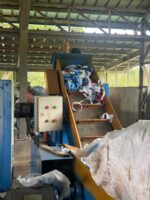Agriculture Secretary Francisco P. Tiu Laurel Jr. on Wednesday unveiled an initiative that will fulfill President Ferdinand Marcos Jr.’s campaign promise to lower rice prices to P20 per kilo.
The pilot phase of the P20 rice program will be in the Visayas, home to millions of Filipinos. Each household will be entitled to purchase up to 10 kilos of rice per week, or 40 kilos per month, at the subsidized price.
Secretary Tiu Laurel said the DA has initially planned to implement the program on a pilot run until December, which could even be stretched to February.
“But the President has given the directive to the Department of Agriculture to formulate this to be sustainable through 2028,” he told reporters in a live streamed news conference from Cebu.
The DA chief said the program had been on the drawing board since last year but its implementation had to be delayed due to high rice prices.
He said the Visayas was chosen as pilot area due to the high number of financially vulnerable families and the availability of sufficient rice stocks from the National Food Authority in the area.
NFA currently sell its aging at a price of P33 per kilo.
NFA has earlier announced that currently holds a buffer stock of 7.17 million bags of milled rice—its highest level since 2020—sufficient to feed the country for nine days. The agency also has P12 billion allocated for palay procurement, with an average farmgate price of P24 per kilo this year.
The DA chief is hopeful that many local government units in the Visayas will participate in the pilot run to ensure many Filipinos in the region will have access to lower-priced rice.
It is unclear when the pilot run will start but would require exemption from the Commission on Elections if the government wants to roll it out before the May 12 midterm polls.
Following the pilot phase, which will be used to fine-tune the program, Secretary Tiu Laurel said the initiative is expected to be rolled out nationwide.
He estimates that, depending on the scale and run rate, the government subsidy could cost between P3.5 billion and P4.5 billion, excluding logistics expenses.






